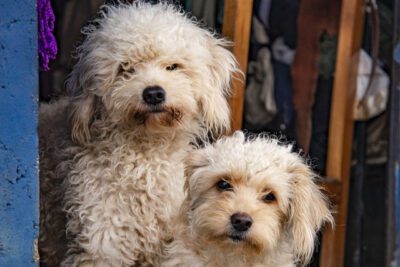

Dogs come in a wide variety of colors and patterns, making them one of the most diverse species when it comes to coat coloration. From solid colors to intricate patterns, there is a color for every dog lover out there. In this article, we will explore the different colors and patterns that dogs can have, so let's dive in and discover the fascinating world of dog coat colors.
Solid colors are the most common and straightforward coat colors in dogs. These dogs have a uniform color throughout their entire coat, without any markings or patterns. Some examples of solid colors include black, white, brown, and tan. Solid-colored dogs are often seen in breeds like Labrador Retrievers, German Shepherds, and Doberman Pinschers.
Bi-color dogs have two distinct colors on their coat. Typically, one color is dominant and covers most of the body, while the other color appears as markings on specific areas such as the face, chest, or paws. Common bi-color combinations include black and white, brown and white, and tan and white. Breeds like Border Collies, Boxers, and Dalmatians often exhibit bi-color patterns.
Tri-color dogs have three distinct colors on their coat. These colors are usually distributed in specific patterns, with one dominant color covering most of the body, and the other two colors appearing as markings. The most common tri-color combination is black, white, and tan. Breeds like Beagles, Bernese Mountain Dogs, and Cavalier King Charles Spaniels are known for their beautiful tri-color coats.
Merle is a unique coat pattern characterized by patches of diluted color on a solid base color. The diluted patches can be of various shades, such as blue, red, or chocolate. The merle pattern gives the coat a marbled or mottled appearance, creating a stunning and eye-catching effect. Breeds like Australian Shepherds, Border Collies, and Great Danes often exhibit the merle pattern.
Brindle is a coat pattern characterized by streaks or stripes of a darker color on a lighter base color. The stripes can be thin or thick, creating a unique and striking appearance. Brindle patterns can be seen in various colors, such as brindle black, brindle brown, and brindle fawn. Breeds like Boxers, Greyhounds, and Bull Terriers are known for their brindle coats.
Sable is a coat pattern characterized by a mix of colors, usually with a darker color on the back and a lighter color on the chest and legs. The sable pattern can create a gradient effect, with the colors blending seamlessly into each other. Sable patterns can be seen in various shades, such as black sable, red sable, and silver sable. Breeds like German Shepherds, Shetland Sheepdogs, and Belgian Malinois often exhibit the sable pattern.
Piebald is a coat pattern characterized by large patches of white on a solid base color. The patches can be irregular in shape and size, creating a unique and eye-catching appearance. Piebald patterns can be seen in various colors, such as piebald black, piebald brown, and piebald tan. Breeds like Dalmatians, Bull Terriers, and English Setters often exhibit the piebald pattern.
Ticking is a coat pattern characterized by small spots or flecks of color on a solid base color. The spots are usually of a contrasting color, creating a speckled or freckled appearance. Ticking patterns can be seen in various colors, such as black ticking, liver ticking, and blue ticking. Breeds like Australian Cattle Dogs, English Pointers, and English Springer Spaniels often exhibit the ticking pattern.
Roan is a coat pattern characterized by a mix of colored and white hairs evenly distributed throughout the coat. The roan pattern gives the coat a salt-and-pepper or dappled appearance. Roan patterns can be seen in various colors, such as blue roan, red roan, and chocolate roan. Breeds like English Setters, Weimaraners, and American Cocker Spaniels often exhibit the roan pattern.
Harlequin is a coat pattern characterized by large irregular patches of color on a white base. The patches can be of various colors, creating a striking and unique appearance. Harlequin patterns are commonly seen in breeds like Great Danes and Dalmatians.
In conclusion, dogs come in a wide array of colors and patterns, ranging from solid colors to intricate patterns like merle, brindle, sable, piebald, ticking, roan, and harlequin. Each color and pattern adds to the beauty and uniqueness of every dog. Whether you prefer a solid-colored dog or a dog with a more complex pattern, there is a color for everyone. So, the next time you see a dog, take a moment to appreciate the incredible diversity of colors and patterns that make them so special.
Leave a Reply
Related posts